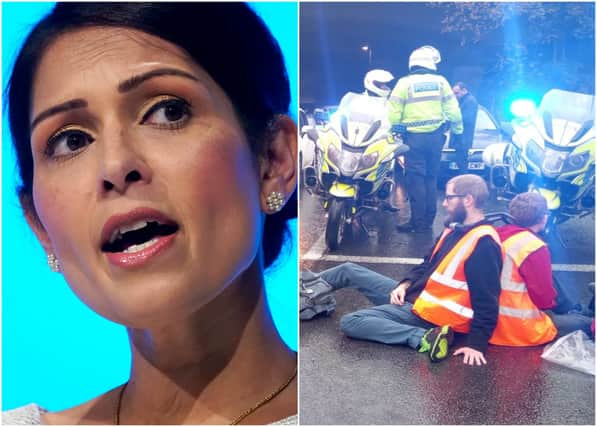These are the new powers set to be handed to police to tackle disruptive protesters


Priti Patel will hand new powers to the police which will allow them to stop disruptive protesters from travelling around the country.
The move comes after a series of demonstrations by Insulate Britain on major roads in England has caused delays to motorists.
Advertisement
Hide AdAdvertisement
Hide AdThe Home Secretary will say in her Conservative party conference speech that the introduction of criminal disruption prevention orders will stop the movement of “prolific offenders”. The move is likely to anger civil liberty groups.
Ms Patel is also preparing to announce an increase in the maximum penalties for disrupting a motorway, while also criminalising interference with major roads, railways and the press.
She is expected to say that the new powers will help police deal with the “small minority of offenders” who are “intent” on travelling around the country with the aim of “causing disruption and misery across our communities”.
What Patel will say about violence against women
In the wake of the murder of Ms Everard at the hands of police officer Wayne Couzens and the death of Sabina Nessa, she will say those targeting women and girls will “feel the full force of the law” upon them.
Advertisement
Hide AdAdvertisement
Hide Ad“Such unconscionable crimes and acts of violence against women and girls have no place in our society. And that is why I have redoubled my efforts to ensure women and girls feel safer.”
Patel on asylum seekers and new drugs policy
Meanwhile, Ms Patel will also tell activists there is “no reason” for an asylum seeker to cross the Channel from France as she renews her vow to control the flow of small boats arriving into the UK.
The Home Secretary will also use her Conservative Party conference address to announce a £15 million expansion in testing suspects for drugs on arrest, which could lead them to being given treatment for their addictions.
She will also announce five pilot areas will be given extra powers to test suspects arrested on suspicion of crimes beyond the usual “trigger” offences.
A version of this article originally appeared on NationalWorld.com